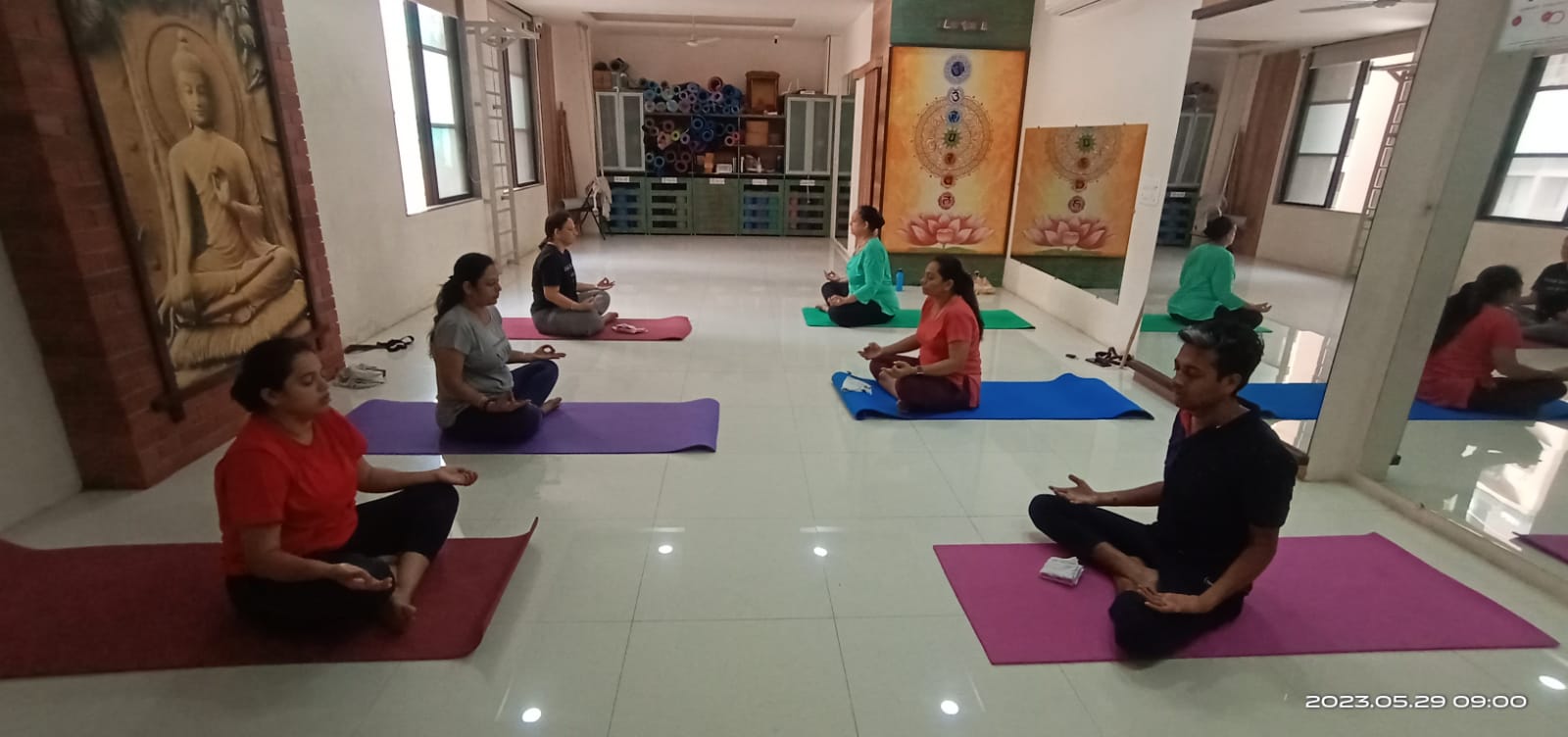Yoga Master Certification Course 500 Hrs

Module 1: Foundations of Yoga Philosophy and Lifestyle (100 hours)
Week 1-2: Immersive Yoga Philosophy Retreat
· Sankhya and Vedanta Immersion:
· In-depth discussions on the dualities of nature (Prakriti) and the pursuit of self-realization.
· Meditation retreat with daily guided sessions to deepen philosophical understanding.
· Philosophical Dialogues:
· Interactive philosophical dialogues and debates to encourage critical thinking.
· Group discussions on applying ancient wisdom to modern challenges.
Week 3-4: Yoga Lifestyle and Ethics
· Holistic Living Practices:
· Exploration of yogic diet, daily routines, and lifestyle choices for balance.
· Practicum on incorporating yogic principles into everyday life.
· Ethical Dilemmas in Teaching:
· Case studies and role-playing exercises addressing ethical challenges in yoga teaching.
· Development of a personal code of ethics and conduct.
Module 2: Advanced Asana and Energetic Practices (120 hours)
Week 5-8: Mastering Asana and Alignment
· Advanced Asana Labs:
· Daily intensive practice labs focusing on mastery of advanced poses.
· Individualized attention to address specific alignment challenges.
· Creative Sequencing Workshops:
· Collaboration with dance instructors for inspiration in creating fluid and expressive sequences.
· Partner-based asana exploration for enhanced understanding of energy exchange.
Week 9-12: Advanced Pranayama and Energetic Anatomy
· Pranayama Intensive:
· Mastery of advanced pranayama techniques, including ratio breathing and Kumbhaka.
· Exploration of the relationship between breath, energy, and consciousness.
· Energetic Anatomy Immersion:
· In-depth study of the energy systems, including nadis, chakras, and koshas.
· Practical application of energetic practices for personal and group transformation.
Module 3: Art of Teaching and Creative Expression (120 hours)
Week 13-16: Teaching Mastery and Personal Expression
· Expressive Arts Integration:
· Incorporation of expressive arts (movement, poetry, journaling) into teaching.
· Personalized projects for self-expression and creativity.
· Teaching Philosophies Workshop:
· Developing a unique teaching philosophy statement and approach.
· Peer feedback and refinement of teaching styles.
Week 17-20: Specialized Workshops and Advanced Teaching Techniques
· Guest Workshops:
· Specialized workshops led by guest instructors, such as acro-yoga, yin yoga, or therapeutic applications.
· Collaborative projects with guest instructors to enhance teaching skills.
· Innovative Teaching Techniques:
· Incorporation of technology (virtual reality, live streaming) into class delivery.
· Advanced adjustments and alignment techniques for unique asana variations.
Module 4: Therapeutics and Yoga for Special Populations (80 hours)
Week 21-24: Yoga Therapy and Specialized Populations
· Therapeutic Yoga Practices:
· Practical application of yoga for common health conditions (e.g., anxiety, insomnia, chronic pain).
· Case studies and group discussions on adapting yoga for diverse needs.
· Hands-On Therapeutics Workshop:
· In-person and virtual workshops with physical therapists for hands-on therapeutic techniques.
· Practice sessions on designing personalized therapeutic plans.
Module 5: Advanced Meditation, Mindfulness, and Spiritual Integration (80 hours)
Week 25-28: Advanced Meditation Practices and Spiritual Integration
· Meditation Retreat:
· A week-long silent meditation retreat in a serene natural setting.
· Guided sessions on exploring altered states of consciousness.
· Spiritual Integration Workshops:
· Integrating spiritual principles into teaching without religious dogma.
· Group discussions on personal spiritual experiences and growth.
Module 6: Advanced Anatomy and Physiology (60 hours)
Week 29-32: Anatomy for Yoga Therapists
· Applied Anatomy for Therapeutics:
· Exploration of anatomy through the lens of therapeutic yoga.
· Virtual reality anatomy simulations for interactive learning.
· Functional Anatomy Labs:
· Hands-on labs exploring joint movements, muscle actions, and their relevance to asana.
· Application of anatomy knowledge in personalized teaching scenarios.
Module 7: Personal Growth and Transformation (40 hours)
Week 33-36: Inner Journey and Self-Discovery
· Psycho-Spiritual Integration:
· Psychodynamic exploration of the self through yoga and meditation.
· Journaling and self-inquiry practices for deep personal reflection.
· Group Dynamics and Support:
· Group therapy sessions for shared experiences and mutual support.
· Guidance on navigating personal challenges during the transformative process.
Module 8: Integration and Culmination (20 hours)
Week 37-38: Final Projects and Integration
· Community Projects:
· Collaborative projects addressing social or environmental challenges.
· Presentations and discussions on the impact of yoga on community well-being.
· Integration and Graduation:
· Integration workshops to weave together the entire learning journey.
· Graduation ceremony with personalized acknowledgments and blessings.
Unique Components:
1. Global Satsangs:
· Virtual or in-person global gatherings for participants to share insights and experiences.
· Opportunities for cross-cultural dialogue on yoga and spirituality.
2. Personalized Retreat Toolkit:
· Training on designing personalized yoga retreats for future endeavors.
· Guidance on creating transformative experiences for retreat participants.
3. Interdisciplinary Collaboration:
· Collaborations with professionals from diverse fields, such as psychology, nutrition, and the arts.
· Workshops with experts in fields related to yoga therapy.
4. Innovative Technology Integration:
· Virtual reality experiences for anatomy and alignment exploration.
· Online learning platforms for continuous education, community building, and mentorship.
5. Advanced Business and Marketing Skills:
· In-depth workshops on building and sustaining a successful yoga business.
· Strategies for branding and marketing unique teaching offerings.
6. Culinary Exploration:
· Integration of cooking classes with a focus on yogic nutrition.
· Field trips to local markets for a hands-on understanding of food choices.
7. Holistic Wellness Toolkit:
· Training on integrating holistic wellness practices into teaching, including aromatherapy and sound healing.
· Resources for creating personalized wellness plans for students.
8. Individualized Learning Paths:
· Creation of individualized learning paths based on participant goals and interests.
· Personalized mentorship plans for ongoing support after graduation.
Register Now